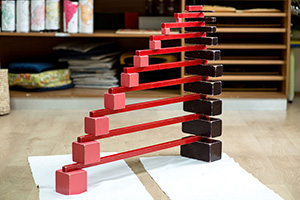Montessori vs traditional preschool
The goal of both Montessori and traditional kindergarten is the same:
to provide learning experiences for the child
to provide learning experiences for the child
Montessori School

- Emphasis on: cognitive and social development
- Teacher has unobtrusive role in classroom
- Environment and method encourage self-discipline
- Mainly individual instruction
- Mixed age grouping
- Grouping encourages children to teach and help each other
- Child chooses work
- Child discovers own concepts from self-teaching tasks
- Child works as long as they wish on chosen project
- Child sets own learning pace
- Child spots own errors from feedback material
- Child reinforces own learning by repetition of work and internal feelings of success
- Multi-sensory materials for physical exploration
- Organized program for learning care of self and environment(serving self food, wiping a table. etc.)
- Child can work where they chose, move around and talk at will (yet not disturb work of others); group work is voluntary
- Organized programs for parents to understand the Montessori philosophy and participate in the learning process.
Traditional Preschool
- Emphasis on: social development
- Teacher is center of classroom
- Teacher acts as primary enforcer of discipline
- Group and individual instruction
- Same age grouping
- Most teaching done by teacher
- Curriculum structured for child
- Child guided to concepts by teacher
- Child generally allotted specific time for work
- Instruction pace usually set by group norm
- If work is corrected, errors usually pointed out by teacher
- Learning is reinforced externally by repetition and rewards
- Fewer materials for sensory development
- Less emphasis on self-care instruction
- Child usually assigned own chair; encouraged to participate, sit still and listen during group sessions
- Voluntary parent involvement
The goal of both Montessori and traditional preschools is the same: to provide learning experiences for the child. The biggest differences lie in the kind of learning experiences each school provides and the methods they use to accomplish this goal.
Montessori educators believe these differences are important because they help shape how a child learns, their work habits and their future attitude towards themselves and the world around them

